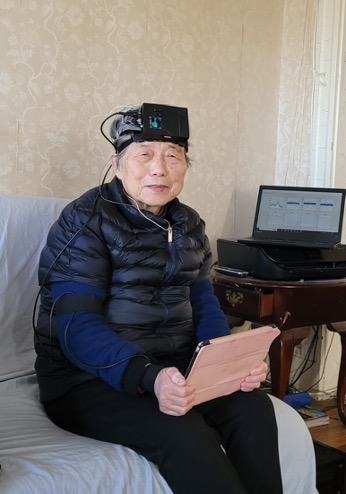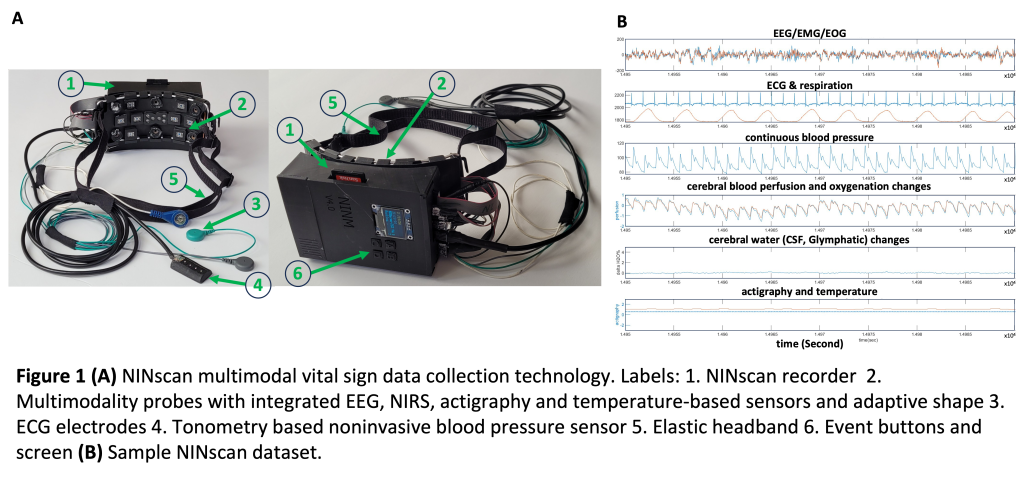Investigator:
Quan Zhang, Massachusetts General Hospital
MassAITC Cohort: Year 2 (AD/ADRD)

Project Accomplishments: This project developed a wearable brain-monitoring device that older adults, including those with early Alzheimer’s disease, can use at home. The device is easy to wear and tracks brain activity, heart rate, breathing, and blood flow while users complete simple thinking tasks. Researchers collected data from 30 participants—half with cognitive impairment and half without—and created a secure system for storing and analyzing this information. The goal is to make brain health assessments more accessible and less stressful by allowing people to use the technology in their own homes.
Using advanced artificial intelligence (AI), the team built models that can analyze the data to predict memory performance and detect signs of Alzheimer’s disease. These models are based on deep learning techniques and are being refined to identify patterns that match clinical diagnoses. The project has already led to a U.S. patent and presentations at national conferences, and the researchers are now working with experts to mine the data for key insights. This work lays the foundation for more accessible and scalable brain health monitoring technologies that could help doctors monitor brain health more easily and intervene earlier in the progression of Alzheimer’s.
Initial Proposal Abstract: More than 5 million Americans are living with AD—the sixth leading cause of death in the U.S. and the only leading cause of death that cannot be prevented, cured, or substantially slowed. Early and accurate diagnosis can save up to $7.9 trillion in medical and care costs and is therefore a critical need. However, going to the hospital for health evaluations can be onerous for everyone, particularly so for older adults with limited mobility, vision and/or cognition, as well as variable access to transportation and home caregivers. Home-based assessment could be a solution, but existing assessment tools for AD—including PET, MRI, and biomarkers in cerebrospinal fluid or plasma—are cumbersome, expensive, or invasive, making them ill-suited for home use or even regular screening purposes. An easy-to-use, home-based screening test with good sensitivity and specificity for identifying AD would thus be of tremendous value and fill an unmet clinical need. No such technology currently exists.
This project will generate an adapted version of NINscan, a Near-Infrared Neuromonitoring Device, so older adults or AD patients can collect high quality brain and physiological data at home. The device will then be used to conduct in-home home data collections during rest and cognitive tasks in older adults and AD patients recruited from the Massachusetts Alzheimer’s Disease Research Center.

Outcomes:
- Patent Awarded: US 12 167 919 B2 – System and method for non-invasive, intracranial brain motion monitoring
 The underlying technology and methodology for the pilot funded device, NINscan, was awarded a patent in December 2024. Source: US 12,167,919 B2 (patentsgazette.uspto.gov)
The underlying technology and methodology for the pilot funded device, NINscan, was awarded a patent in December 2024. Source: US 12,167,919 B2 (patentsgazette.uspto.gov) - Poster Presentation: a2 National Symposium 2024
 Title: AI-Supported In-Home Brain Assessments for Older Adults and Persons with Alzheimer’s Disease Authors: Jian Shi, Jacqueline Gong, Gary Stragman, Deborah Blacker, Quan Zhang
Title: AI-Supported In-Home Brain Assessments for Older Adults and Persons with Alzheimer’s Disease Authors: Jian Shi, Jacqueline Gong, Gary Stragman, Deborah Blacker, Quan Zhang
